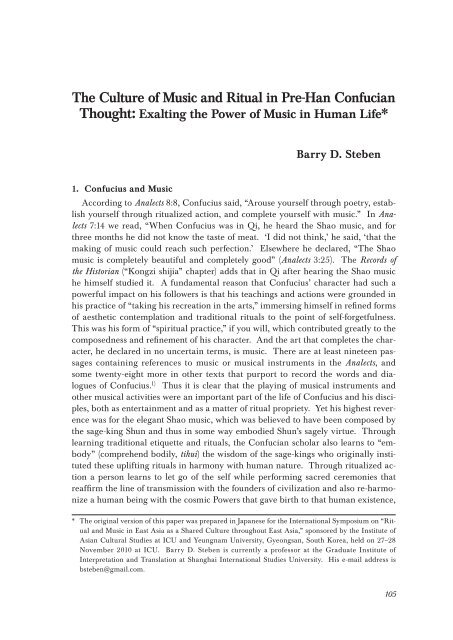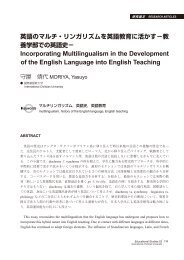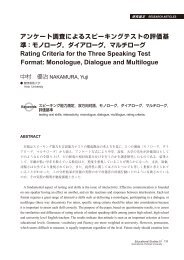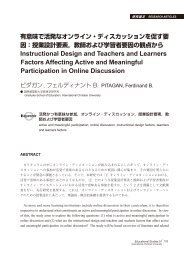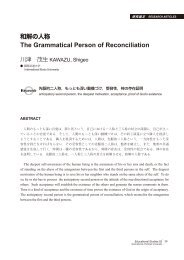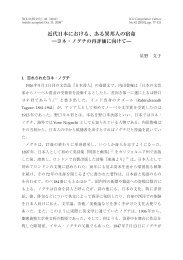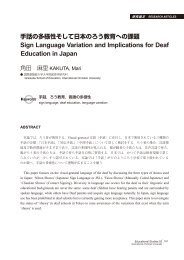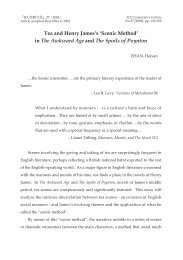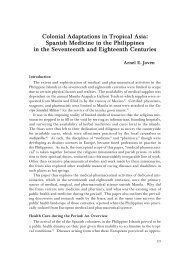The Culture of Music and Ritual in Pre-Han Confucian - subsite
The Culture of Music and Ritual in Pre-Han Confucian - subsite
The Culture of Music and Ritual in Pre-Han Confucian - subsite
You also want an ePaper? Increase the reach of your titles
YUMPU automatically turns print PDFs into web optimized ePapers that Google loves.
<strong>The</strong> <strong>Culture</strong> <strong>of</strong> <strong>Music</strong> <strong>and</strong> <strong>Ritual</strong> <strong>in</strong> <strong>Pre</strong>-<strong>Han</strong> <strong>Confucian</strong><br />
Thought: Exalt<strong>in</strong>g the Power <strong>of</strong> <strong>Music</strong> <strong>in</strong> Human Life*<br />
1. Confucius <strong>and</strong> <strong>Music</strong><br />
Barry D. Steben<br />
Accord<strong>in</strong>g to Analects 8:8, Confucius said, “Arouse yourself through poetry, establish<br />
yourself through ritualized action, <strong>and</strong> complete yourself with music.” In Analects<br />
7:14 we read, “When Confucius was <strong>in</strong> Qi, he heard the Shao music, <strong>and</strong> for<br />
three months he did not know the taste <strong>of</strong> meat. ‘I did not th<strong>in</strong>k,’ he said, ‘that the<br />
mak<strong>in</strong>g <strong>of</strong> music could reach such perfection.’ Elsewhere he declared, “<strong>The</strong> Shao<br />
music is completely beautiful <strong>and</strong> completely good” (Analects 3:25). <strong>The</strong> Records <strong>of</strong><br />
the Historian (“Kongzi shijia” chapter) adds that <strong>in</strong> Qi after hear<strong>in</strong>g the Shao music<br />
he himself studied it. A fundamental reason that Confucius’ character had such a<br />
powerful impact on his followers is that his teach<strong>in</strong>gs <strong>and</strong> actions were grounded <strong>in</strong><br />
his practice <strong>of</strong> “tak<strong>in</strong>g his recreation <strong>in</strong> the arts,” immers<strong>in</strong>g himself <strong>in</strong> ref<strong>in</strong>ed forms<br />
<strong>of</strong> aesthetic contemplation <strong>and</strong> traditional rituals to the po<strong>in</strong>t <strong>of</strong> self-forgetfulness.<br />
This was his form <strong>of</strong> “spiritual practice,” if you will, which contributed greatly to the<br />
composedness <strong>and</strong> ref<strong>in</strong>ement <strong>of</strong> his character. And the art that completes the character,<br />
he declared <strong>in</strong> no uncerta<strong>in</strong> terms, is music. <strong>The</strong>re are at least n<strong>in</strong>eteen passages<br />
conta<strong>in</strong><strong>in</strong>g references to music or musical <strong>in</strong>struments <strong>in</strong> the Analects, <strong>and</strong><br />
some twenty-eight more <strong>in</strong> other texts that purport to record the words <strong>and</strong> dialogues<br />
<strong>of</strong> Confucius. 1) Thus it is clear that the play<strong>in</strong>g <strong>of</strong> musical <strong>in</strong>struments <strong>and</strong><br />
other musical activities were an important part <strong>of</strong> the life <strong>of</strong> Confucius <strong>and</strong> his disciples,<br />
both as enterta<strong>in</strong>ment <strong>and</strong> as a matter <strong>of</strong> ritual propriety. Yet his highest reverence<br />
was for the elegant Shao music, which was believed to have been composed by<br />
the sage-k<strong>in</strong>g Shun <strong>and</strong> thus <strong>in</strong> some way embodied Shun’s sagely virtue. Through<br />
learn<strong>in</strong>g traditional etiquette <strong>and</strong> rituals, the <strong>Confucian</strong> scholar also learns to “embody”<br />
(comprehend bodily, tihui) the wisdom <strong>of</strong> the sage-k<strong>in</strong>gs who orig<strong>in</strong>ally <strong>in</strong>stituted<br />
these uplift<strong>in</strong>g rituals <strong>in</strong> harmony with human nature. Through ritualized action<br />
a person learns to let go <strong>of</strong> the self while perform<strong>in</strong>g sacred ceremonies that<br />
reaffirm the l<strong>in</strong>e <strong>of</strong> transmission with the founders <strong>of</strong> civilization <strong>and</strong> also re-harmonize<br />
a human be<strong>in</strong>g with the cosmic Powers that gave birth to that human existence,<br />
* <strong>The</strong> orig<strong>in</strong>al version <strong>of</strong> this paper was prepared <strong>in</strong> Japanese for the International Symposium on “<strong>Ritual</strong><br />
<strong>and</strong> <strong>Music</strong> <strong>in</strong> East Asia as a Shared <strong>Culture</strong> throughout East Asia,” sponsored by the Institute <strong>of</strong><br />
Asian Cultural Studies at ICU <strong>and</strong> Yeungnam University, Gyeongsan, South Korea, held on 27–28<br />
November 2010 at ICU. Barry D. Steben is currently a pr<strong>of</strong>essor at the Graduate Institute <strong>of</strong><br />
Interpretation <strong>and</strong> Translation at Shanghai International Studies University. His e-mail address is<br />
bsteben@gmail.com.<br />
105
dissolv<strong>in</strong>g social frictions <strong>in</strong> the process.<br />
Thus <strong>Confucian</strong> self-cultivation, as is so <strong>in</strong> every other great culturo-religious tradition,<br />
<strong>in</strong>volves the <strong>in</strong>tegration <strong>of</strong> body, m<strong>in</strong>d <strong>and</strong> will catalyzed by experiences <strong>of</strong><br />
self-submission <strong>and</strong> self-transcendence mediated by music, art <strong>and</strong> ritual. <strong>The</strong> aspiration<br />
for sagehood <strong>and</strong> the effort <strong>of</strong> self-control that keep one on the path at “prosaic”<br />
times disappear <strong>in</strong> such times <strong>of</strong> reverential aesthetic transcendence, dissolved <strong>in</strong><br />
a pure absorption <strong>in</strong> the rhythmic energy field <strong>of</strong> the present moment. <strong>The</strong> aspiration<br />
to wholeness f<strong>in</strong>ds an unmov<strong>in</strong>g anchor-flame with<strong>in</strong> the heart where it is already<br />
<strong>in</strong> a state <strong>of</strong> complete fulfillment, replac<strong>in</strong>g an unsteady directedness toward<br />
some envisioned achievement <strong>in</strong> the future. Because music that is noble <strong>and</strong> spiritual<br />
<strong>in</strong> nature draws the heart-m<strong>in</strong>d toward this po<strong>in</strong>t <strong>of</strong> unmov<strong>in</strong>g <strong>in</strong>wardly-centered<br />
absorption, open<strong>in</strong>g the heart to deep transformative spiritual energies, it is capable<br />
<strong>of</strong> complet<strong>in</strong>g a person’s character–when that character has already been cultivated<br />
by the study <strong>of</strong> poetry <strong>and</strong> ritual propriety. S<strong>in</strong>ce a major form <strong>of</strong> music <strong>in</strong> all cultures<br />
is poetry put to music, 2) <strong>and</strong> s<strong>in</strong>ce music is <strong>of</strong>ten comb<strong>in</strong>ed with dance, a collective<br />
ritualization <strong>of</strong> movement, we can easily imag<strong>in</strong>e <strong>in</strong> Confucius’ direct experience<br />
a type <strong>of</strong> ceremonial musical performance that comb<strong>in</strong>ed all three aesthetic<br />
realms spoken <strong>of</strong> <strong>in</strong> Analects 8:8–poetry, ritualized movement (dance), <strong>and</strong> <strong>in</strong>strumental<br />
music–a situation where the “music” that completes the maturation <strong>of</strong> character<br />
does so by absorb<strong>in</strong>g <strong>and</strong> sublat<strong>in</strong>g the other arts that provide its foundations<br />
with<strong>in</strong> the <strong>Confucian</strong> Way. In traditional cultures poetry is normally not someth<strong>in</strong>g<br />
that one sits <strong>and</strong> reads silently, but someth<strong>in</strong>g that is sung or chanted or recited, <strong>of</strong>ten<br />
<strong>in</strong> a ritualized public ceremony, so that through the rhythmic coord<strong>in</strong>ation <strong>of</strong><br />
bodily movements, voice <strong>and</strong> breath it becomes a self-transform<strong>in</strong>g perform<strong>in</strong>g art<br />
calm<strong>in</strong>g <strong>and</strong> <strong>in</strong>tegrat<strong>in</strong>g body <strong>and</strong> m<strong>in</strong>d <strong>in</strong> a way that spreads outward from the<br />
“performers” to those who present at the ceremony, who may also participate<br />
through chant<strong>in</strong>g, prayer <strong>and</strong> bodily expressions <strong>of</strong> reverence. We f<strong>in</strong>d such practices<br />
<strong>in</strong> the ritual traditions <strong>of</strong> all religions, but <strong>in</strong> many ways we also f<strong>in</strong>d them <strong>in</strong> traditions<br />
<strong>of</strong> perform<strong>in</strong>g arts, which <strong>in</strong> their orig<strong>in</strong>s draw much from the religious traditions<br />
<strong>of</strong> the societies <strong>in</strong> which they develop.<br />
Confucius became an archetypal figure <strong>in</strong> Ch<strong>in</strong>ese culture precisely because his<br />
mode <strong>of</strong> learn<strong>in</strong>g-<strong>and</strong>-practice <strong>in</strong>tegrated all <strong>of</strong> the different dimensions <strong>of</strong> learn<strong>in</strong>g–<strong>in</strong>tellectual,<br />
historical, artistic, ethical, physical, spiritual <strong>and</strong> social–<strong>in</strong> a pr<strong>of</strong>oundly<br />
balanced way, <strong>and</strong> it is fitt<strong>in</strong>g that the importance <strong>of</strong> music <strong>in</strong> <strong>Confucian</strong>ism<br />
is seen to lie <strong>in</strong> its power to balance <strong>and</strong> harmonize. If music serves to balance <strong>and</strong><br />
harmonize the <strong>in</strong>dividual’s character, then it also serves to promote balance <strong>and</strong><br />
harmony <strong>in</strong> society, two goals that are always <strong>in</strong>tertw<strong>in</strong>ed <strong>in</strong> <strong>Confucian</strong>ism, anchored<br />
as it is <strong>in</strong> a concept <strong>of</strong> cosmic harmony. “<strong>Music</strong> is the harmony <strong>of</strong> Heaven<br />
<strong>and</strong> Earth; ritual is the order <strong>of</strong> Heaven <strong>and</strong> Earth” (Yueji 14). 3) <strong>The</strong> core purpose <strong>of</strong><br />
all Confucius’ teach<strong>in</strong>gs was to br<strong>in</strong>g about a well-governed <strong>and</strong> well-ordered society<br />
where every <strong>in</strong>dividual obta<strong>in</strong>s the education, care <strong>and</strong> sustenance that he or she<br />
needs <strong>and</strong> the opportunities to fulfill his or her social obligations, <strong>and</strong> he was educat<strong>in</strong>g<br />
young people to serve <strong>in</strong> government so that they could help br<strong>in</strong>g such a society<br />
<strong>in</strong>to be<strong>in</strong>g. Thus among Confucius’ disciples after his time, a crucial task was<br />
to try to recover the sage-k<strong>in</strong>gs’ <strong>in</strong>stitutions <strong>of</strong> ritual <strong>and</strong> music as far as possible <strong>and</strong><br />
106
compassionate human be<strong>in</strong>g, or it can be neglected or corrupted to produce a human<br />
be<strong>in</strong>g who is deficient <strong>in</strong> the ability to perceive the pa<strong>in</strong> <strong>in</strong> other people’s lives<br />
as if it were pa<strong>in</strong> <strong>in</strong> one’s own body. 12) “If a person is not sensitive to others’ suffer<strong>in</strong>g<br />
[i.e., is not ren], <strong>of</strong> what use is ritual? If a person is not sensitive to others’ suffer<strong>in</strong>g,<br />
<strong>of</strong> what use is music?” (Analects 3:3). 13) Thus through its aesthetic qualities, music<br />
completes or “rounds out” the moral character <strong>of</strong> the <strong>in</strong>dividual who is already<br />
sensitized to the moral dimensions <strong>of</strong> human relationships.<br />
3. <strong>The</strong> Nature <strong>and</strong> Structure <strong>of</strong> Courtly <strong>Music</strong><br />
In attempt<strong>in</strong>g to analyze what “music” is <strong>and</strong> how it comes to be with a certa<strong>in</strong><br />
amount <strong>of</strong> precision, the Yueji is compelled to use these three <strong>in</strong>terrelated characters,<br />
sheng, y<strong>in</strong> <strong>and</strong> yue, <strong>in</strong> more carefully dist<strong>in</strong>guished ways, or <strong>in</strong> more specific mean<strong>in</strong>gs<br />
that, we can assume, were current <strong>in</strong> ritual culture at the time the text was written.<br />
<strong>The</strong> text starts by proclaim<strong>in</strong>g that all y<strong>in</strong> arise from the human heart when<br />
that heart has been moved by external th<strong>in</strong>gs. Thus y<strong>in</strong> cannot refer to “sound” <strong>in</strong><br />
general, but to an element <strong>in</strong> the constitution <strong>of</strong> music. This mov<strong>in</strong>g <strong>of</strong> the heart<br />
first expresses itself as sheng, which here obviously means “voice” or “vocal sounds.”<br />
<strong>The</strong> commentator Zheng Xuan expla<strong>in</strong>s that y<strong>in</strong> refers to a mixed concatenation <strong>of</strong><br />
the five sounds <strong>in</strong> the ancient five-note Ch<strong>in</strong>ese scale (gong, shang, jiao, zhi, <strong>and</strong> yu),<br />
while sheng refers to a s<strong>in</strong>gle uttered sound. Thus y<strong>in</strong> are vocal sounds to which a<br />
pattern (wen) has been added, that is, the word refers to a sort <strong>of</strong> tune or air, someth<strong>in</strong>g<br />
formed by putt<strong>in</strong>g <strong>in</strong> pleas<strong>in</strong>g order the vocal sounds made by people <strong>in</strong> response<br />
to various external th<strong>in</strong>gs or situations. Legge’s translation as “modulations<br />
<strong>of</strong> the voice” (or “modulations <strong>of</strong> sound”) is well conceived, though suggest<strong>in</strong>g someth<strong>in</strong>g<br />
less formed than a popular “tune.” Even these tunes are declared to arise from<br />
the human heart. Y<strong>in</strong> are a necessary constituent <strong>of</strong> music (yue)–<strong>in</strong> fact the text<br />
says “music is born from y<strong>in</strong>”–but they are not yet fully music <strong>in</strong> the conception <strong>of</strong><br />
the Yueji. <strong>The</strong> masses all know y<strong>in</strong>–tunes <strong>and</strong> airs that arise <strong>in</strong> popular culture–<br />
but they do not know music <strong>in</strong> the proper sense, which requires a man <strong>of</strong> broad<br />
learn<strong>in</strong>g <strong>and</strong> noble character (junzi, J. kunshi). Yet s<strong>in</strong>ce the general concept <strong>of</strong> music<br />
<strong>in</strong> Ch<strong>in</strong>a <strong>and</strong> elsewhere <strong>in</strong>cludes such popular tunes, it is appropriate that y<strong>in</strong> constitutes<br />
the first character <strong>in</strong> the compound for “music,” y<strong>in</strong>yue ( J. ongaku), which by <strong>in</strong>clud<strong>in</strong>g<br />
the y<strong>in</strong> character carries a more <strong>in</strong>clusive mean<strong>in</strong>g than the s<strong>in</strong>gle character<br />
yue <strong>and</strong> allows that a knowledge <strong>of</strong> y<strong>in</strong> (tunes or modulations <strong>of</strong> voice) is necessary<br />
for the underst<strong>and</strong><strong>in</strong>g <strong>of</strong> music <strong>of</strong> the ref<strong>in</strong>ed variety.<br />
In the Yueji analysis, two steps are necessary for vocal sounds (sheng) to become<br />
music: first, the uttered sounds express<strong>in</strong>g different emotions must respond to one<br />
another, which will give rise to changes (<strong>in</strong> pitch, rhythm, etc.). 14) When these<br />
changes become a formula (fang), glossed by Zheng Xuan as wenzhang–orderly patterns<br />
15) –they are called y<strong>in</strong>–tunes formulated out <strong>of</strong> orig<strong>in</strong>ally spontaneous vocal<br />
sounds <strong>of</strong> various emotional timbre. 16) When such tunes, or modulations <strong>of</strong> the<br />
voice, are arranged (bi) harmoniously <strong>and</strong> accompanied by musical <strong>in</strong>struments, <strong>and</strong><br />
a ceremonial dance is performed with the dancers hold<strong>in</strong>g the shield <strong>and</strong> axe or the<br />
pheasant feather <strong>and</strong> long-haired-ox tail, then this is what is called “music” (yue). 17)<br />
Thus we see that the “music” that was most important <strong>in</strong> the ancient Ch<strong>in</strong>ese phi-<br />
109
losophy <strong>and</strong> practice <strong>of</strong> government was a highly ceremonial affair sharply dist<strong>in</strong>guished<br />
from the simple music <strong>of</strong> the people. It required a prescribed formal dance<br />
<strong>and</strong> ritual implements symbolic <strong>of</strong> the founders <strong>of</strong> the Zhou dynasty, which imparted<br />
a k<strong>in</strong>d <strong>of</strong> sacred aura <strong>in</strong>vok<strong>in</strong>g the orig<strong>in</strong>al foundations <strong>of</strong> the polity <strong>and</strong> the creators<br />
<strong>of</strong> its basic rituals. <strong>The</strong> Yueji states,<br />
110<br />
Hence the bell, the drum, the flute, <strong>and</strong> the sound<strong>in</strong>g-stone; the plume, the fife,<br />
the shield, <strong>and</strong> the axe are the <strong>in</strong>struments (qi) <strong>of</strong> music; the curv<strong>in</strong>gs <strong>and</strong><br />
stretch<strong>in</strong>gs (<strong>of</strong> the body), the bend<strong>in</strong>g down <strong>and</strong> lift<strong>in</strong>g up (<strong>of</strong> the head); <strong>and</strong> the<br />
evolutions <strong>and</strong> numbers (<strong>of</strong> the performers), with the slowness <strong>and</strong> rapidity (<strong>of</strong><br />
their movements), are its elegent accomplishments (wen). <strong>The</strong> dishes, round<br />
<strong>and</strong> square, the st<strong>and</strong>s, the st<strong>and</strong><strong>in</strong>g dishes, the prescribed rules <strong>and</strong> their elegant<br />
variations (zhidu wenzhang), are the <strong>in</strong>struments <strong>of</strong> ceremonies; the ascend<strong>in</strong>g<br />
<strong>and</strong> descend<strong>in</strong>g, the positions high <strong>and</strong> low, the wheel<strong>in</strong>gs about, <strong>and</strong> the<br />
chang<strong>in</strong>g <strong>of</strong> robes, are their elegant accomplishments. <strong>The</strong>refore they who<br />
knew the essential nature <strong>of</strong> ceremonies <strong>and</strong> music could frame them; <strong>and</strong> they<br />
who had learned their elegant accomplishments could h<strong>and</strong> them down. <strong>The</strong><br />
framers may be pronounced sage; the transmitters, <strong>in</strong>telligent. Intelligence<br />
<strong>and</strong> sagehood are other names for transmitt<strong>in</strong>g <strong>and</strong> <strong>in</strong>vent<strong>in</strong>g. 18)<br />
Noth<strong>in</strong>g could be clearer <strong>and</strong> more graphic than this passage <strong>in</strong> illustrat<strong>in</strong>g what<br />
was really meant by “ritual-<strong>and</strong>-music” <strong>in</strong> the ancient Ch<strong>in</strong>ese courtly tradition.<br />
<strong>The</strong> <strong>Confucian</strong> scholars made themselves useful to the rulers <strong>and</strong> aristocracy by<br />
study<strong>in</strong>g, preserv<strong>in</strong>g <strong>and</strong> perform<strong>in</strong>g these elaborate rituals, <strong>and</strong> it is easy to underst<strong>and</strong><br />
why the philosopher Mozi condemned the waste <strong>and</strong> extravagance they <strong>in</strong>volved<br />
with seem<strong>in</strong>gly no utilitarian purpose. Yet <strong>in</strong> a polity where the central locus<br />
<strong>of</strong> sacred (cosmic) authority <strong>and</strong> the central locus <strong>of</strong> political authority were one <strong>and</strong><br />
the same, we can see that such ceremonies performed a role analagous to the rites<br />
<strong>and</strong> liturgy <strong>of</strong> the Catholic Church, which expressed visibly <strong>and</strong> audibly the div<strong>in</strong>e<br />
<strong>and</strong> temporal authority <strong>of</strong> the <strong>in</strong>stitution, its control over material resources, its transcendent<br />
dignity, <strong>and</strong> its unmovable rootedness <strong>in</strong> venerable ancient traditions. <strong>The</strong><br />
follow<strong>in</strong>g passage <strong>in</strong> the Yueji even rem<strong>in</strong>ds one <strong>of</strong> the Catholic Church’s perennial<br />
battle to preserve orthodoxy <strong>and</strong> suppress heterodoxy, which was certa<strong>in</strong>ly related<br />
to its cont<strong>in</strong>ual production <strong>of</strong> sacred music for the liturgy.<br />
Whenever treacherous sounds (jian sheng) affect people’s hearts, a rebellious<br />
spirit (ni qi) rises <strong>in</strong> response, <strong>and</strong> when that rebellious spirit takes manifestation,<br />
it gives rise to licentious music. When upright sounds (zheng sheng) affect<br />
people’s hearts, an obedient spirit (shun qi) rises <strong>in</strong> response, <strong>and</strong> when that<br />
obedient spirit takes manifestation, it gives rise to harmonious music. <strong>The</strong> chorus<br />
responds to the s<strong>in</strong>ger; the deviant <strong>and</strong> the eccentric, the crooked <strong>and</strong> the<br />
straight, each returns to its own class; the pr<strong>in</strong>ciples <strong>of</strong> the ten thous<strong>and</strong> th<strong>in</strong>gs<br />
all move mutually accord<strong>in</strong>g to their category. <strong>The</strong>refore, the man <strong>of</strong> noble<br />
character looks back to his feel<strong>in</strong>gs to harmonize his will. 19)
A “rebellious spirit” suggests resistance aga<strong>in</strong>st political or religious authority, <strong>and</strong><br />
its association with “licentious music” rem<strong>in</strong>ds one <strong>of</strong> the Catholic Church’s custom<br />
<strong>of</strong> charg<strong>in</strong>g heretics with sexual licentiousness to discredit them. However, it is also<br />
true that religious faith <strong>and</strong> political loyalty, regarded as card<strong>in</strong>al virtues <strong>in</strong> all traditionalist<br />
cultures, also require submission to authority, though not necessarily unconditional<br />
submission. So if social harmony is someth<strong>in</strong>g desirable, so is the spirit<br />
<strong>of</strong> obedience, the spirit <strong>of</strong> submission, which is also the core pr<strong>in</strong>ciple <strong>of</strong> collective<br />
life <strong>in</strong> all religious orders. Both the music-<strong>and</strong>-liturgy <strong>of</strong> the Christian Church <strong>and</strong><br />
the ceremonial ritual-<strong>and</strong>-music <strong>of</strong> ancient Ch<strong>in</strong>a functioned to support <strong>and</strong> reward<br />
obedience to authority, which was also a fundamental part <strong>of</strong> Confucius’ ethical<br />
teach<strong>in</strong>gs.<br />
An <strong>in</strong>stitution that can muster the resources <strong>and</strong> learn<strong>in</strong>g for such gr<strong>and</strong> <strong>and</strong> impos<strong>in</strong>g<br />
ceremonies cannot easily become an object <strong>of</strong> rebellion, 20) not the least because<br />
its rituals were believed to susta<strong>in</strong> the cosmic <strong>and</strong> calendrical harmony upon<br />
which life <strong>and</strong> agriculture depended. We must grant the claim <strong>of</strong> the Yueji that the<br />
creators <strong>and</strong> transmitters <strong>of</strong> these traditions were highly <strong>in</strong>telligent men, men who<br />
were capable <strong>of</strong> see<strong>in</strong>g far beyond the material, military <strong>and</strong> <strong>in</strong>stitutional dimensions<br />
<strong>of</strong> state-build<strong>in</strong>g. Of course the writers <strong>of</strong> the Book <strong>of</strong> Rites were also formulat<strong>in</strong>g<br />
an ideology <strong>of</strong> rule that would hopefully assure their employment <strong>in</strong> government,<br />
which helps account for the almost magical powers they attribute to rites <strong>and</strong><br />
music. Yet because this practical motivation was totally <strong>in</strong> l<strong>in</strong>e with Confucius’ own<br />
purpose <strong>in</strong> educat<strong>in</strong>g his disciples, it should not be viewed as a corruption <strong>of</strong> the<br />
orig<strong>in</strong>al spirit <strong>of</strong> <strong>Confucian</strong>ism.<br />
4. <strong>The</strong> “Orig<strong>in</strong>al Voice” <strong>and</strong> the Relation between <strong>Ritual</strong> <strong>and</strong> <strong>Music</strong><br />
How does music come about? At its outset the Yueji emphasizes that music ultimately<br />
arises from the emotions <strong>of</strong> the human heart, 21) imply<strong>in</strong>g that no matter how<br />
culturally ref<strong>in</strong>ed <strong>and</strong> formalized the music may become, its ultimate root is <strong>in</strong> the<br />
spontaneous voice <strong>of</strong> the human heart, the “honne” or “orig<strong>in</strong>al voice” <strong>of</strong> the heart <strong>of</strong><br />
the <strong>in</strong>dividual, if you will, before its process<strong>in</strong>g by the conventions <strong>and</strong> rules <strong>of</strong> society.<br />
Yet it is an “orig<strong>in</strong>al voice” that arises <strong>in</strong> response to external th<strong>in</strong>gs <strong>and</strong> situations,<br />
the “heart” respond<strong>in</strong>g to “th<strong>in</strong>gs.” Poetry, like music, is also the expression<br />
<strong>in</strong> sound <strong>of</strong> the heart’s response to external th<strong>in</strong>gs, <strong>and</strong> like music it can also draw<br />
the heart back to the tranquil silence that is its orig<strong>in</strong>al Heaven-given nature. Thus<br />
poetry (the Book <strong>of</strong> Songs) “arouses” the spirit, as Confucius put it, <strong>and</strong> also cultivates<br />
the nature, matures the character, sensitizes the heart, <strong>and</strong> hones one’s power to use<br />
words. Between poetry <strong>and</strong> music, however, Confucius lists “ritual,” through which<br />
a person “becomes established”–able to st<strong>and</strong> as an <strong>in</strong>dividual <strong>in</strong> society with an<br />
awareness <strong>of</strong> all the complex relationships <strong>and</strong> responsibilities <strong>in</strong> which he is <strong>in</strong>volved.<br />
Logically, music is capable <strong>of</strong> complet<strong>in</strong>g the character because its elements<br />
are rooted orig<strong>in</strong>ally <strong>in</strong> the spontaneous movements <strong>of</strong> the heart, so that it can s<strong>of</strong>ten<br />
the stiffness <strong>and</strong> artificiality that tends to result from preoccupation with the external<br />
ritual prescriptions <strong>of</strong> society. “<strong>Music</strong> creates unity; ceremony creates differences.<br />
From unity comes mutual <strong>in</strong>timacy; from difference, mutual respect. When<br />
music prevails, th<strong>in</strong>gs flow together; when ceremony prevails, there is separation”<br />
111
(Yueji 10). Ceremonies are “square,” while music is “round.” 22)<br />
Indeed, if we consider the classical Ch<strong>in</strong>ese concept that Heaven is round <strong>and</strong><br />
Earth is square, we can anticipate some <strong>of</strong> what the Yueji says about the differences<br />
between music <strong>and</strong> ritual. <strong>Music</strong>, as the harmoniz<strong>in</strong>g non-material force, is obviously<br />
ak<strong>in</strong> to Heaven.<br />
112<br />
Heaven is high <strong>and</strong> Earth is low, <strong>and</strong> between them the ten thous<strong>and</strong> th<strong>in</strong>gs are<br />
dispersed <strong>and</strong> dist<strong>in</strong>ct. On that basis the ritual system was <strong>in</strong>stituted. Yet the<br />
cosmos flows forth without cease, th<strong>in</strong>gs com<strong>in</strong>g together <strong>and</strong> unit<strong>in</strong>g <strong>in</strong> cont<strong>in</strong>ual<br />
transformation. On that basis music arose. In spr<strong>in</strong>g the crops are planted<br />
<strong>and</strong> <strong>in</strong> summer they grow; this corresponds to the virtue <strong>of</strong> benevolence (ren).<br />
In autumn the crops are harvested <strong>and</strong> <strong>in</strong> w<strong>in</strong>ter they are stored; this corresponds<br />
to the virtue <strong>of</strong> rectify<strong>in</strong>g (yi). <strong>The</strong> virtue <strong>of</strong> benevolence is ak<strong>in</strong> to music;<br />
the virtue <strong>of</strong> rectify<strong>in</strong>g is ak<strong>in</strong> to ritual. <strong>Music</strong> embraces all through harmony;<br />
therefore it pursues the expansive spiritual forces (shen) <strong>and</strong> follows<br />
Heaven. <strong>Ritual</strong> dist<strong>in</strong>guishes what is appropriate; therefore it dwells with the<br />
contractive spiritual forces (gui) <strong>and</strong> follows the earth. Accord<strong>in</strong>gly the sage<br />
creates music <strong>in</strong> order to respond to Heaven <strong>and</strong> <strong>in</strong>stitutes rituals <strong>in</strong> accord<br />
with the Earth. When ritual <strong>and</strong> music are clear <strong>and</strong> complete, Heaven <strong>and</strong><br />
earth properly manifest their respective controll<strong>in</strong>g powers. 23)<br />
<strong>Music</strong> is warm <strong>and</strong> ritual is cold; music draws man toward Heaven <strong>and</strong> the spiritual<br />
while ritual keeps him bound to the earth, to human society <strong>and</strong> its regulat<strong>in</strong>g structures.<br />
Yet the two are complementary <strong>and</strong> equally necessary, each contribut<strong>in</strong>g <strong>in</strong><br />
its own way to civiliz<strong>in</strong>g mank<strong>in</strong>d. “<strong>Music</strong> appeared <strong>in</strong> the Gr<strong>and</strong> Beg<strong>in</strong>n<strong>in</strong>g (<strong>of</strong> all<br />
th<strong>in</strong>gs), <strong>and</strong> ceremonies had their place on the completion <strong>of</strong> them.” 24) “<strong>Music</strong><br />
emerges from with<strong>in</strong>, while ceremony acts from without. Because music emerges<br />
from with<strong>in</strong> it embodies tranquility; because ritual acts from without it embodies<br />
cultural ref<strong>in</strong>ement. … When music enacts its full function, there will be no resentments;<br />
when ritual enacts its full function, there will be no strife. What ritual <strong>and</strong><br />
music mean is that all-under-Heaven is ruled <strong>and</strong> brought to order simply by people<br />
bow<strong>in</strong>g <strong>and</strong> yield<strong>in</strong>g to each other with courtesy.” 25) It is a pr<strong>of</strong>ound <strong>in</strong>sight that if<br />
an entire population can be taught common rituals <strong>of</strong> courtesy, with an emphasis on<br />
yield<strong>in</strong>g to the other (lirang), the society will have a high degree <strong>of</strong> cohesiveness <strong>and</strong><br />
a strong resistance to the forces <strong>of</strong> disorder. Manners are the lubricant <strong>of</strong> society,<br />
without which the gears will get clogged <strong>and</strong> social <strong>in</strong>teractions will not proceed<br />
smoothly. Of necessity, this vision <strong>of</strong> social order has a cosmological ground<strong>in</strong>g.<br />
“Let there be an <strong>in</strong>telligent underst<strong>and</strong><strong>in</strong>g <strong>of</strong> the nature <strong>and</strong> <strong>in</strong>teraction <strong>of</strong> (Heaven<br />
<strong>and</strong> Earth), <strong>and</strong> there will be the ability to practice well both ceremonies <strong>and</strong> music.”<br />
26) As we have seen above <strong>in</strong> Yueji 17, the fundamental virtues <strong>of</strong> ren <strong>and</strong> yi, like<br />
gui <strong>and</strong> shen (the latter which orig<strong>in</strong>ally meant “ghosts <strong>and</strong> gods”), are abstracted to<br />
the level <strong>of</strong> universal forces, so they call for a translation that has the greatest possible<br />
degree <strong>of</strong> generality. Can we deny that the need <strong>of</strong> love or benevolence <strong>and</strong> the<br />
need for rectification are the two sides <strong>of</strong> human culture, <strong>of</strong>ten com<strong>in</strong>g <strong>in</strong>to conflict,<br />
sometimes violently, but also capable <strong>of</strong> work<strong>in</strong>g <strong>in</strong> harmony <strong>and</strong> balance when an-
over the place, but it is very evident that it is danc<strong>in</strong>g around an unmov<strong>in</strong>g center.<br />
And that is related to the deeply calm<strong>in</strong>g effect that the music has–to its ability to<br />
reunite our spirit <strong>and</strong> consciousness with the liv<strong>in</strong>g energies <strong>of</strong> the physical body.<br />
Yet cultivated movement <strong>of</strong> the body <strong>and</strong> the tongue through ritual is also necessary,<br />
if <strong>of</strong>ten neglected because <strong>of</strong> its tendency to become exclusive <strong>and</strong> elitist. As<br />
music <strong>in</strong>culcates virtue from with<strong>in</strong>, ritual <strong>in</strong>culcates it from without, <strong>and</strong> both are<br />
necessary to build a balanced character <strong>and</strong> a harmonious society. “<strong>The</strong> knowledge<br />
<strong>of</strong> music leads to the subtle spr<strong>in</strong>gs that underlie the rules <strong>of</strong> ceremony. He who has<br />
apprehended both ceremonies <strong>and</strong> music may be pronounced to be a possessor <strong>of</strong><br />
virtue. Virtue means realisation (<strong>in</strong> one’s self).” 29) For Confucius, on the foundation<br />
<strong>of</strong> the study <strong>of</strong> the Odes <strong>and</strong> the mastery <strong>of</strong> ritual, it was music that could complete<br />
the cultivation <strong>of</strong> character, as if there was a k<strong>in</strong>d <strong>of</strong> progression. Yet here we see<br />
that ritual <strong>and</strong> music share a close symbiotic relationship, <strong>and</strong> that it is only the man<br />
<strong>of</strong> deep learn<strong>in</strong>g <strong>and</strong> character who truly underst<strong>and</strong>s music who comes close to underst<strong>and</strong><strong>in</strong>g<br />
the spiritual foundations <strong>of</strong> ritual <strong>and</strong> ceremony. Both are required for<br />
a person to be virtuous–<strong>and</strong> virtue should be understood as a state <strong>of</strong> be<strong>in</strong>g <strong>and</strong><br />
not only a state <strong>of</strong> “do<strong>in</strong>g.” As <strong>in</strong> Christianity, only if one is already virtuous <strong>in</strong><br />
one’s basic state <strong>of</strong> be<strong>in</strong>g–hav<strong>in</strong>g accepted the forgiveness <strong>of</strong> one’s s<strong>in</strong>s <strong>of</strong>fered freely<br />
through the sacrifice on the Cross–can one hope to be virtuous most <strong>of</strong> the time <strong>in</strong><br />
one’s actions. Redemption <strong>and</strong> sanctification precede action–<strong>and</strong> are realized <strong>in</strong> a<br />
circular dialectic with action–<strong>and</strong> without ritual or liturgy redemption cannot be<br />
activated or “realized.” Both <strong>Confucian</strong>ism <strong>and</strong> Christianity without the participation<br />
<strong>in</strong> ritual become like birds try<strong>in</strong>g to fly with one w<strong>in</strong>g.<br />
114<br />
<strong>The</strong> occasions <strong>and</strong> forms <strong>of</strong> ceremonies are different, but it is the same feel<strong>in</strong>g<br />
<strong>of</strong> respect (which they express). <strong>The</strong> styles <strong>of</strong> musical pieces are different, but it<br />
is the same feel<strong>in</strong>g <strong>of</strong> love (which they promote). <strong>The</strong> essential nature (q<strong>in</strong>g) <strong>of</strong><br />
ceremonies <strong>and</strong> music be<strong>in</strong>g the same, the <strong>in</strong>telligent k<strong>in</strong>gs, one after another,<br />
cont<strong>in</strong>ued them as they found them. <strong>The</strong> occasions <strong>and</strong> forms were accord<strong>in</strong>g<br />
to the times when they were made; the names agreed with the merit which they<br />
commemorated. 30)<br />
If ritual ceremonies <strong>and</strong> music are complementary <strong>and</strong> share the same essential nature,<br />
it means that a person <strong>of</strong> consummate virtue must be able to delve deeply <strong>in</strong>to<br />
the non-material, trans-social realm <strong>of</strong> musical harmony, draw<strong>in</strong>g spiritual <strong>and</strong> moral<br />
energy therefrom, but that person also has to be able at any time to step out <strong>of</strong><br />
their absorption to face an audience or a social situation that requires total presence<br />
<strong>of</strong> m<strong>in</strong>d <strong>and</strong> a confident, pr<strong>of</strong>icient mastery <strong>of</strong> the ritual requirements <strong>of</strong> the situation.<br />
In S<strong>in</strong>gapore I met a Japanese diplomat who was pr<strong>of</strong>icient on the viol<strong>in</strong>, <strong>and</strong><br />
gave a f<strong>in</strong>e performance at the Japanese embassy before a highly dist<strong>in</strong>guished audience.<br />
Even dur<strong>in</strong>g his performance, while relaxed <strong>and</strong> natural, he did not lose the<br />
dignity <strong>of</strong> his diplomatic status, <strong>and</strong> even though he had really expressed his <strong>in</strong>ner<br />
heart dur<strong>in</strong>g the performance, after the performance he performed with admirable<br />
aplomb all <strong>of</strong> the verbal <strong>and</strong> social rituals that were appropriate for the status position<br />
he occupied. Dur<strong>in</strong>g his whole musical <strong>and</strong> diplomatic performance, he never
wore an artificial expression <strong>and</strong> never looked the slightest bit tense or stiff. When I<br />
spoke to him personally at some length on the subject <strong>of</strong> music <strong>and</strong> the promotion <strong>of</strong><br />
classical music <strong>in</strong> S<strong>in</strong>gapore, he showed no trace <strong>of</strong> pride or impatience or a split<br />
m<strong>in</strong>d, even though I was a mere university pr<strong>of</strong>essor with somewhat less-than-perfect<br />
Japanese language abilities. In socializ<strong>in</strong>g with this rather young but not <strong>in</strong>experienced<br />
diplomat, I felt strongly that his character as an unpretentious <strong>and</strong> genial<br />
gentleman had been much affected–”completed” if you will–by his years <strong>of</strong> viol<strong>in</strong><br />
tra<strong>in</strong><strong>in</strong>g <strong>and</strong> perform<strong>in</strong>g, because the absorption <strong>and</strong> aplomb <strong>of</strong> his play<strong>in</strong>g (based<br />
on the harmonization <strong>of</strong> body <strong>and</strong> m<strong>in</strong>d) naturally carried over <strong>in</strong>to the ritual words<br />
<strong>and</strong> actions required <strong>of</strong> him <strong>in</strong> his diplomatic role, enabl<strong>in</strong>g him to drop the<br />
artificiality, excessive formality, tension or pride that can easily slip <strong>in</strong>to a public appearance<br />
<strong>of</strong> a politician or diplomat. All people who fill important positions <strong>in</strong> public<br />
life, <strong>in</strong>clud<strong>in</strong>g academics, should take the time to learn some sort <strong>of</strong> musical perform<strong>in</strong>g<br />
art, <strong>and</strong> learn it to some degree <strong>of</strong> pr<strong>of</strong>iciency, regard<strong>in</strong>g it as an essential<br />
element <strong>of</strong> their character tra<strong>in</strong><strong>in</strong>g as well as an excellent ice-breaker at formal social<br />
functions. As the Liji declares, music is the m<strong>and</strong>ate <strong>of</strong> Heaven <strong>and</strong> Earth.<br />
6. <strong>Music</strong> as a Bridge between the Court <strong>and</strong> the People <strong>and</strong> a Warn<strong>in</strong>g <strong>of</strong> Trouble<br />
Of course other basic ancient <strong>Confucian</strong> texts, such as the Mencius <strong>and</strong> the Xunzi,<br />
also discuss the importance <strong>of</strong> music. Mencius’ (ca. 372–289) conversation with the<br />
K<strong>in</strong>g <strong>of</strong> Qi (Mencius 1B:8) is highly relevant to our topic. Hear<strong>in</strong>g a report that the<br />
k<strong>in</strong>g said he loved music, Mencius said, “If the k<strong>in</strong>g’s love <strong>of</strong> music were very great,<br />
the k<strong>in</strong>gdom <strong>of</strong> Qi would be near to a state <strong>of</strong> good government!” 31) On another<br />
day, he had an audience with the k<strong>in</strong>g, but the k<strong>in</strong>g confessed <strong>in</strong> embarrassment that<br />
he did not enjoy the music <strong>of</strong> the ancient sovereigns, but only present-day popular<br />
music. Mencius replied, “If the k<strong>in</strong>g’s love <strong>of</strong> music were very great, the k<strong>in</strong>gdom <strong>of</strong><br />
Qi would be near to a state <strong>of</strong> good government! <strong>The</strong> music <strong>of</strong> the present day is<br />
just like the music <strong>of</strong> antiquity, as regards effect<strong>in</strong>g that.” 32) <strong>The</strong> k<strong>in</strong>g asked for<br />
pro<strong>of</strong>, <strong>and</strong> Mencius gave a totally logical explanation that if the k<strong>in</strong>g did not conf<strong>in</strong>e<br />
his enjoyment <strong>of</strong> music <strong>and</strong> hunt<strong>in</strong>g to himself alone, but made it possible for the<br />
people to enjoy the same pleasures as he himself, he would become a true k<strong>in</strong>g <strong>and</strong><br />
his realm would know peace <strong>and</strong> contentment. An idealistic proposal to be sure, but<br />
there is no trace <strong>of</strong> any claim <strong>of</strong> some sort <strong>of</strong> mystical effect <strong>of</strong> royal music <strong>and</strong> ceremonies<br />
on the welfare <strong>of</strong> the realm. Mencius’ proposal matches the vision <strong>of</strong> Confucius<br />
<strong>and</strong> the Yueji that if a greater number <strong>of</strong> <strong>in</strong>dividuals learn to deeply enjoy music,<br />
the effect <strong>of</strong> their <strong>in</strong>ner joy <strong>and</strong> tranquility, <strong>and</strong> <strong>of</strong> their rounded characters, will<br />
gradually spread to society at large. However, the authors <strong>of</strong> the Yueji would have<br />
had a problem with Mencius’ assertion that even popular music can help br<strong>in</strong>g<br />
about a harmonious society because it also gives pleasure, for the Yueji is very concerned<br />
with the effects on the emotions <strong>of</strong> different sorts <strong>of</strong> music, <strong>and</strong> regards many<br />
types <strong>of</strong> music, characteristic <strong>of</strong> particular states, as not wholesome at all <strong>in</strong> their effect.<br />
Moreover, it claims that the impend<strong>in</strong>g dest<strong>in</strong>y <strong>of</strong> a state, whether it will<br />
flourish, decl<strong>in</strong>e or collapse, can be perceived <strong>in</strong> the nature <strong>of</strong> the music that is be<strong>in</strong>g<br />
heard there, <strong>and</strong> this does not mean the music <strong>of</strong> the royal courts. Obviously the<br />
conception <strong>of</strong> the relationship between music <strong>and</strong> the state goes well beyond simply<br />
115
ment. Confucius’ conception <strong>of</strong> music as the art that completes the cultivation <strong>of</strong><br />
character can help bolster this tradition, just as the Western liberal arts tradition can<br />
help bolster the revival <strong>of</strong> this precious teach<strong>in</strong>g <strong>of</strong> Confucius. Both can help spread<br />
respect for the role that early music musicians <strong>and</strong> other “archeological artists” <strong>in</strong><br />
both East <strong>and</strong> West, plus the scholars who support <strong>and</strong> propagate their work, play <strong>in</strong><br />
society as custodians <strong>and</strong> revivers <strong>of</strong> priceless cultural traditions that reconnect people<br />
with the spiritual sources <strong>of</strong> their civilization <strong>and</strong> the spiritual resources for happ<strong>in</strong>ess.<br />
7. <strong>The</strong> Project Should be Cont<strong>in</strong>ued<br />
Now if, <strong>in</strong> the view <strong>of</strong> the Yueji, scholars should study the ref<strong>in</strong>ed music traditions<br />
passed down from the early sage-k<strong>in</strong>gs, <strong>and</strong> government <strong>of</strong>ficials should study popular<br />
music <strong>and</strong> poetry collected from among the people, both <strong>in</strong> the cause <strong>of</strong> social<br />
harmony, then this is a tradition that sorely needs to be <strong>in</strong>herited today, where the<br />
pr<strong>of</strong>ound generation gap <strong>in</strong> the realm <strong>of</strong> music <strong>and</strong> the dom<strong>in</strong>ance <strong>of</strong> ephemeral<br />
mass-oriented music <strong>in</strong> the mass media is already lead<strong>in</strong>g to the virtual ext<strong>in</strong>ction <strong>of</strong><br />
many precious musical traditions. When traditional music <strong>and</strong> dance <strong>of</strong> popular orig<strong>in</strong><br />
are performed before scholars or political leaders, <strong>and</strong> when music-dance traditions<br />
associated with ancient court cultures or pre-modern high society are performed<br />
before scholars <strong>and</strong> ord<strong>in</strong>ary people, a communication between the ages is<br />
opened up, <strong>and</strong> it becomes possible for some <strong>of</strong> the deepest <strong>in</strong>spiration <strong>of</strong> former<br />
times to feed <strong>in</strong>to the creative, ever-evolv<strong>in</strong>g culture <strong>of</strong> the present day. <strong>The</strong>se<br />
ref<strong>in</strong>ed perform<strong>in</strong>g arts are precious cultural heritages that the human community<br />
should do everyth<strong>in</strong>g possible to preserve, <strong>and</strong> their value to society <strong>and</strong> the spirit,<br />
as Confucius understood, goes far beyond the level <strong>of</strong> mere enterta<strong>in</strong>ment. 35)<br />
Personally, as a lover <strong>of</strong> classical <strong>and</strong> sacred music, I would say that this <strong>Confucian</strong><br />
project is already mov<strong>in</strong>g firmly <strong>in</strong> the direction <strong>of</strong> realization today, though<br />
not necessarily <strong>in</strong> association with “<strong>Confucian</strong>ism.” To take Ch<strong>in</strong>a as an example,<br />
the rapid spread <strong>of</strong> Western classical music education <strong>and</strong> appreciation is well<br />
known, though still only reach<strong>in</strong>g a rather small proportion <strong>of</strong> the population.<br />
Along with the study <strong>of</strong> the piano <strong>and</strong> the viol<strong>in</strong>, the physical construction <strong>of</strong> state<strong>of</strong>-the-art<br />
concert halls <strong>in</strong> every city is boom<strong>in</strong>g, <strong>and</strong> the facilities are certa<strong>in</strong>ly attract<strong>in</strong>g<br />
audiences (<strong>in</strong> my experience they are usually sold out). In those countries<br />
that have long possessed state-<strong>of</strong>-the-art facilities, many symphony orchestras <strong>and</strong><br />
early music ensembles are actively <strong>in</strong>volved <strong>in</strong> spread<strong>in</strong>g music appreciation abroad<br />
<strong>in</strong> society, among all generations <strong>in</strong>clud<strong>in</strong>g the youth, help<strong>in</strong>g to assure that the<br />
world <strong>of</strong> music performance does not stagnate <strong>in</strong>to an exclusive elite <strong>of</strong> music<br />
afficionadoes who snub their noses as those who are “outside the club.” Schools <strong>and</strong><br />
colleges that give strong emphasis to musical education seem to be <strong>in</strong>creas<strong>in</strong>g at a<br />
fairly rapid rate, <strong>in</strong> spite <strong>of</strong> the regular appearance <strong>of</strong> news stories report<strong>in</strong>g the<br />
dropp<strong>in</strong>g <strong>of</strong> musical education <strong>in</strong> public schools. It is also easier than ever before to<br />
listen to the best <strong>of</strong> man’s musical creations throughout history privately through record<strong>in</strong>gs,<br />
though such private enjoyment needs to be transmuted <strong>in</strong>to communication<br />
with others, <strong>and</strong> ideally it should rema<strong>in</strong> an adjunct to attend<strong>in</strong>g live performances.<br />
<strong>The</strong> music enjoyed needs to percolate <strong>in</strong>to one’s character <strong>and</strong><br />
118
elationships, <strong>and</strong> to be carried <strong>in</strong> some way, such as through choral performance,<br />
<strong>in</strong>to the public arena where it can help elevate the general culture. Otherwise it can<br />
easily become a k<strong>in</strong>d <strong>of</strong> self-<strong>in</strong>dulgence or escape from society. In every cultural<br />
<strong>and</strong> religious tradition there is a tension between f<strong>in</strong>d<strong>in</strong>g the path to ecstasy <strong>and</strong><br />
transmut<strong>in</strong>g its <strong>in</strong>tense spiritual energy <strong>in</strong>to compassionate action for the benefit <strong>of</strong><br />
others, as symbolized by the bodhisattva who refuses to enter Nirvana until all be<strong>in</strong>gs<br />
are saved. Confucius worked on complet<strong>in</strong>g his character through music, but<br />
that gave him the energy <strong>and</strong> spiritiual resources to teach others <strong>in</strong>defatigably, <strong>and</strong><br />
through that to <strong>in</strong>fluence East Asian culture over a long time <strong>in</strong> some very fundamental<br />
ways.<br />
<strong>The</strong> Yueji represents the first fully articulate formulation <strong>of</strong> the vision <strong>of</strong> that sort<br />
<strong>of</strong> transformation, <strong>and</strong> the task or vision that it lays out needs to be carried forward<br />
<strong>in</strong> every generation by pr<strong>of</strong>essional musicians, amateur musicians, <strong>and</strong> non-musicians<br />
alike. <strong>The</strong> conditions for the activation <strong>of</strong> the vision <strong>of</strong> the Yueji are <strong>in</strong> many<br />
ways better today than ever before, <strong>and</strong> though the connection with government has<br />
been attenuated, the achievement <strong>of</strong> the vision on a large scale–because <strong>of</strong> the cost<br />
<strong>of</strong> the facilities–still requires a great amount <strong>of</strong> government moral <strong>and</strong> f<strong>in</strong>ancial<br />
support. <strong>The</strong> facilities are built <strong>and</strong> gett<strong>in</strong>g built, but the problem still lies <strong>in</strong> educat<strong>in</strong>g<br />
more people who have the time, f<strong>in</strong>ancial resources, <strong>and</strong> most <strong>of</strong> all the musical<br />
culture <strong>and</strong> sensitivity to attend <strong>and</strong> enjoy the musical performances be<strong>in</strong>g given.<br />
This is particularly a problem <strong>in</strong> Ch<strong>in</strong>a, where the whole project started out <strong>in</strong> the<br />
first place over 2,500 years ago but seems to have lost its momentum after the <strong>Confucian</strong>s<br />
became bureaucratic functionaries <strong>in</strong> the <strong>Han</strong>. <strong>The</strong> message <strong>of</strong> the Yueji is<br />
as relevant as it ever was, <strong>and</strong> it needs to be propagated. That is the reason for<br />
which the present exploratory essay has been written. Of course the author does not<br />
envision some sort <strong>of</strong> mass conversion <strong>of</strong> society–which is after all dom<strong>in</strong>ated by<br />
popular youth-oriented culture <strong>and</strong> populated by people with a vast variety <strong>of</strong> different<br />
hobbies–but rather a gradual expansion <strong>of</strong> the number <strong>of</strong> <strong>in</strong>tellectually <strong>and</strong> artistically<br />
<strong>in</strong>cl<strong>in</strong>ed people who take time to cultivate their spiritual <strong>and</strong> cultural sensibilities<br />
through the perennial music traditions <strong>of</strong> the East <strong>and</strong>/or the West, whether<br />
through appreciation or performance or both.<br />
<strong>Confucian</strong>ism is an ancient tradition that was actually threatened with ext<strong>in</strong>ction,<br />
but for the past several decades it has been undergo<strong>in</strong>g a healthy revival, at least <strong>in</strong><br />
the universities. Similarly, there are many cultural <strong>and</strong> musical traditions that had<br />
almost died out, but are also <strong>in</strong> recent decades <strong>in</strong> the process <strong>of</strong> be<strong>in</strong>g resurrected,<br />
<strong>in</strong>clud<strong>in</strong>g Western classical music <strong>and</strong> opera <strong>in</strong> Ch<strong>in</strong>a. 36) With this essay I hope to<br />
draw the <strong>in</strong>terest <strong>of</strong> aesthetically conscious <strong>in</strong>dividuals toward some <strong>of</strong> these resurrection<br />
projects, such as the period <strong>in</strong>strument <strong>and</strong> early music movement <strong>in</strong> Europe<br />
<strong>and</strong> America, <strong>and</strong> hopefully help these revivalist movements cross the boundaries<br />
between Eastern <strong>and</strong> Western culure. My own pantheon <strong>in</strong>cludes René Jacobs,<br />
Helmuth Rill<strong>in</strong>g, Ton Koopman, Koopman’s student Masaaki Suzuki, Philippe Herreweghe,<br />
Alan Curtis, John Elliot Gard<strong>in</strong>er, Robert K<strong>in</strong>g, Emmanuel Haïm, R<strong>in</strong>aldo<br />
Aless<strong>and</strong>r<strong>in</strong>i, Matteus Goerne, Thomas Quasth<strong>of</strong>f, Philippe Jaroussky, Andreas<br />
Scholl, the great Mahler conductors, plus many others too numerous to list–not to<br />
mention the many consummate musicians who work with these conductors, ensem-<br />
119
le leaders <strong>and</strong> s<strong>in</strong>gers. 37) Among Baroque s<strong>in</strong>gers <strong>and</strong> musicians, the Canadians<br />
(<strong>in</strong>clud<strong>in</strong>g Angela Hewitt, Kar<strong>in</strong>a Gauv<strong>in</strong>, <strong>and</strong> Marie-Nicole Lemieux) have become<br />
<strong>in</strong>creas<strong>in</strong>gly prom<strong>in</strong>ent on the world stage, <strong>and</strong> as a Canadian this is a matter <strong>of</strong> personal<br />
pride. I also spent some years learn<strong>in</strong>g to love Indian classical music back <strong>in</strong><br />
the golden days <strong>of</strong> Ravi Shankar <strong>and</strong> Ali Akbar Khan, <strong>and</strong> as far as time permits I<br />
hope to delve more <strong>in</strong>to Ch<strong>in</strong>ese, Korean <strong>and</strong> Japanese traditional music as well.<br />
<strong>The</strong> readers <strong>of</strong> this essay undoubtedly have their own rather different sets <strong>of</strong> culture<br />
heroes, but the po<strong>in</strong>t is, while the particular forms may differ, the underly<strong>in</strong>g spirit<br />
<strong>and</strong> purpose are the same: reawaken<strong>in</strong>g the present generations to the <strong>in</strong>credibly<br />
rich musical heritage <strong>of</strong> the past, especially the long-submerged traditions dat<strong>in</strong>g<br />
from before the 19th century. Ideally it would be nice to found an organization or<br />
newsletter called “<strong>Confucian</strong> <strong>Culture</strong> <strong>and</strong> <strong>Music</strong>,” or just “<strong>Pre</strong>modern <strong>Music</strong>al <strong>Culture</strong><br />
East <strong>and</strong> West,” but I cannot afford the time to do such a project on my own.<br />
Communication through exist<strong>in</strong>g magaz<strong>in</strong>es <strong>and</strong> scholarly essays that sometimes<br />
engage one another is probably sufficient. If some <strong>of</strong> the great revivalist musicians<br />
come <strong>in</strong> contact with the traditional <strong>Confucian</strong> theory <strong>of</strong> music, such as by read<strong>in</strong>g<br />
the present essay, I hope that it will help charge them with the conviction that the<br />
welfare <strong>of</strong> mank<strong>in</strong>d <strong>and</strong> the very harmony <strong>of</strong> the universe depend on the quality <strong>of</strong><br />
their play<strong>in</strong>g, that there is noth<strong>in</strong>g more important they could do with their talents<br />
<strong>and</strong> time than what they are already do<strong>in</strong>g–complet<strong>in</strong>g their characters through<br />
music <strong>and</strong> help<strong>in</strong>g others to do the same. Only play<strong>in</strong>g performed with such conviction<br />
can deeply move the audience, <strong>and</strong>, through the audience, make the world <strong>in</strong>to<br />
a more peaceful, civil <strong>and</strong> joy-filled place. It would be nice if some readers skilled <strong>in</strong><br />
draw<strong>in</strong>g would send me a couple <strong>of</strong> portraits <strong>of</strong> Confucius that portray him as a musician<br />
enjoy<strong>in</strong>g tak<strong>in</strong>g his “recreation <strong>in</strong> the arts” out <strong>in</strong> the open fields, depict<strong>in</strong>g<br />
him as much less <strong>of</strong> a stuffy old guy than the traditional <strong>of</strong>ficial portraits, which<br />
were symbols <strong>of</strong> Ch<strong>in</strong>ese <strong>of</strong>ficial orthodoxy. Remember that Confucius was not always<br />
an old man with a beard <strong>and</strong> a long robe! <strong>The</strong>se radical portraits <strong>of</strong> Confucius<br />
would be prime c<strong>and</strong>idates for the covers <strong>of</strong> our first few newsletters, if we can ever<br />
pool our energies to produce one! Or for those to whom the very idea <strong>of</strong> Confucius<br />
is just too <strong>in</strong>corrigibly stuffy, maybe a composite draw<strong>in</strong>g <strong>of</strong> a couple <strong>of</strong> premodern<br />
Western <strong>and</strong> Eastern musical <strong>in</strong>struments would do the trick. <strong>The</strong> eyes lead the way<br />
to the ears.<br />
Whether or not my readers have any <strong>in</strong>terest <strong>in</strong> such dreamy projects, I hope that<br />
the present essay has helped opened their eyes to the depth <strong>of</strong> the ancient Ch<strong>in</strong>ese<br />
philosophy <strong>of</strong> music, <strong>and</strong> will motivate them to look further <strong>in</strong>to the riches that this<br />
tradition has to <strong>of</strong>fer. I believe that the the Ch<strong>in</strong>ese tradition, the Indian tradition,<br />
the Western tradition <strong>and</strong> the Islamic tradition can all agree that it is music–especially<br />
sacred <strong>and</strong> classical music–that completes the cultivation <strong>of</strong> our character,<br />
aided by a reasonable dose <strong>of</strong> ritual directed at a realm beyond the present material<br />
world. Thus I believe we are justified <strong>in</strong> tak<strong>in</strong>g the Yueji beyond its traditional East<br />
Asian context <strong>and</strong> <strong>in</strong>troduc<strong>in</strong>g it as a contributory voice for the newly evolv<strong>in</strong>g subculture<br />
<strong>of</strong> cross-cultural music <strong>and</strong> cross-cultural spirituality. <strong>The</strong> portraits I am<br />
wait<strong>in</strong>g for will have a rather young-look<strong>in</strong>g Confucius play<strong>in</strong>g a sitar (à la Ravi<br />
Shankar), play<strong>in</strong>g a Renaissance lute (à la Paul O’Dette 38) ), play<strong>in</strong>g a dulcimer, play-<br />
120
with its emphasis on the ren (<strong>in</strong>terpersonal moral sensitivity) that perceives all th<strong>in</strong>gs as one body.<br />
13) Ren is usually translated, not without awkwardness, as “benevolence,” “humanity,” “humaneness”<br />
or “humanheartedness.” Roger Ames suggests a more holistic sense <strong>of</strong> the mean<strong>in</strong>g <strong>in</strong> us<strong>in</strong>g “authoritative<br />
conduct” or “authoritative personhood.” This may obscure what seems to be the core<br />
sense <strong>of</strong> the word, “sensitive empathy for other people,” but it does suggest the aspects <strong>of</strong> centeredness,<br />
calmness, firm moral commitment <strong>and</strong> dignified self-control. Some characteristics <strong>of</strong><br />
ren as expla<strong>in</strong>ed by Confucius are: the ren person takes on difficulties first <strong>and</strong> leaves enjoyment<br />
<strong>and</strong> acquisition till later; he is able to be constantly joyful without anxieties <strong>and</strong> bear poverty<br />
without compla<strong>in</strong>t, to be free <strong>of</strong> evil as long as his will is directed toward ren. <strong>The</strong> person <strong>of</strong> ren<br />
takes delight <strong>in</strong> mounta<strong>in</strong>s, <strong>and</strong> he is tranquil <strong>and</strong> long-lived. Wish<strong>in</strong>g to establish himself, he<br />
first establishes others, <strong>and</strong> wish<strong>in</strong>g to achieve someth<strong>in</strong>g he first helps others to achieve it. Ren is<br />
to overcome the self <strong>and</strong> return to ritual propriety, <strong>and</strong> not to act toward others as you would not<br />
wish them to act toward oneself. Ren is to love people.<br />
14) Ichihara’s <strong>in</strong>terpretation here steps a bit far from the orig<strong>in</strong>al text <strong>and</strong> is difficult to translate, but<br />
it appears cogent: “Because the heart responds to th<strong>in</strong>gs <strong>in</strong> a great variety <strong>of</strong> ways, <strong>in</strong> the voice<br />
there naturally occur many changes. <strong>The</strong> changes <strong>in</strong> the voice that produce harmonious [tunes]<br />
are called y<strong>in</strong>. When these y<strong>in</strong> are accompanied by musical <strong>in</strong>struments, <strong>and</strong> a dance is performed<br />
with the use <strong>of</strong> the ritual implements <strong>of</strong> K<strong>in</strong>gs Wen <strong>and</strong> Wu, this is called ‘music.’ “ Legge<br />
<strong>in</strong>terprets the phrase “accompanied by musical <strong>in</strong>struments” as “so as to give pleasure,” s<strong>in</strong>ce the<br />
character for “music” <strong>and</strong> the character for “pleasure” are the same, simply read with different<br />
pronunciations.<br />
15) One ancient mean<strong>in</strong>g <strong>of</strong> wenzhang that seems <strong>of</strong> relevance here is “mixed colors or patterns,”<br />
which occurs <strong>in</strong> the critique <strong>of</strong> music <strong>in</strong> the Mozi <strong>and</strong> aga<strong>in</strong> <strong>in</strong> the History <strong>of</strong> the Later <strong>Han</strong> (Houhan<br />
shu). Wenzhang also occurs <strong>in</strong> the text <strong>of</strong> the Liji (Da Zhuan chapter), where Zheng Xuan glosses it<br />
as lifa–the rules <strong>of</strong> ritual, <strong>and</strong> another commentator as “a system <strong>of</strong> ritual <strong>and</strong> music” (liyue zhidu).<br />
Legge translates it here as “the elegances (<strong>of</strong> ceremony).” A similar usage occurs <strong>in</strong> Analects<br />
8:19, where it is translated by Legge as “elegant regulations.” For the precise quotations <strong>and</strong> further<br />
mean<strong>in</strong>gs, see the entry on wenzhang <strong>in</strong> the H<strong>and</strong>ian on-l<strong>in</strong>e dictionary.<br />
16) A modern Japanese translator <strong>of</strong> the Liji, Ichihara Kōkichi, expla<strong>in</strong>s the mean<strong>in</strong>g <strong>of</strong> y<strong>in</strong>/on here as<br />
ongyoku, which <strong>in</strong> Japanese traditional music usually means a light popular tune, <strong>and</strong> <strong>in</strong> Noh drama<br />
refers to the s<strong>in</strong>g<strong>in</strong>g <strong>and</strong> musical/rhythmical accompaniment as apart from the visual elements<br />
<strong>of</strong> the performance. See Ichihara Kōkichi, Imai Kiyoshi, Suzuki Ryūichi, comp. <strong>and</strong><br />
trans., Raiki, vol. 2 (Tokyo: Shūeisha, 1977), 406. Legge similarly translates y<strong>in</strong> as “airs” (see Ch<strong>in</strong>ese<br />
Text Project Yueji 3 to 6).<br />
17) <strong>The</strong> commentary by Zheng Xuan po<strong>in</strong>ts out that the first two ceremonial objects named were<br />
used <strong>in</strong> the dance <strong>of</strong> K<strong>in</strong>g Wu <strong>and</strong> the second <strong>in</strong> the dance <strong>of</strong> K<strong>in</strong>g Wen. K<strong>in</strong>gs Wen <strong>and</strong> Wu, the<br />
second the son <strong>of</strong> the first, were the founders <strong>of</strong> the Zhou dynasty.<br />
18) Yueji 13, as translated by James Legge (see CTP). Like all <strong>of</strong> the Yueji, the four-character structure<br />
<strong>and</strong> the parallelism <strong>of</strong> this passage make it very beautiful to read <strong>in</strong> the orig<strong>in</strong>al classical<br />
Ch<strong>in</strong>ese, a beauty <strong>of</strong> sound, rhythm <strong>and</strong> imagery that is completely destroyed <strong>in</strong> translation.<br />
19) From passage 30, <strong>in</strong> my translation.<br />
20) It took a vast quantity <strong>of</strong> gross abuses on the part <strong>of</strong> the clergy <strong>and</strong> popes <strong>of</strong> the Catholic Church,<br />
surfac<strong>in</strong>g repeatedly <strong>in</strong> public awareness over hundreds <strong>of</strong> years, to f<strong>in</strong>ally br<strong>in</strong>g about the Protestant<br />
Reformation, <strong>and</strong> even then the rebellion was only successful because <strong>of</strong> the pr<strong>in</strong>t<strong>in</strong>g press<br />
<strong>and</strong> the fragmented nature <strong>of</strong> political power <strong>in</strong> Germany. Yet whether the result<strong>in</strong>g dim<strong>in</strong>ution<br />
or demise <strong>of</strong> the “cosmic power” <strong>of</strong> Christian ritual <strong>in</strong> Protestant l<strong>and</strong>s (Weber’s “disenchantment”<br />
<strong>of</strong> the world) was a loss or a ga<strong>in</strong> for civilization depends on one’s po<strong>in</strong>t <strong>of</strong> view regard<strong>in</strong>g<br />
the character <strong>of</strong> “modernity” as opposed to cultures deeply rooted <strong>in</strong> tradition.<br />
21) Strictly speak<strong>in</strong>g what is stated first is that all y<strong>in</strong> (see below) is/are born from the human heart,<br />
<strong>and</strong> somewhat later (Yueji 2) that music (yue) is born from y<strong>in</strong>, its root be<strong>in</strong>g <strong>in</strong> the human heart<br />
when it is moved by external th<strong>in</strong>gs.<br />
22) Appropriately, <strong>in</strong> colloquial English, a person considered to be old-fashioned or bor<strong>in</strong>gly conventional<br />
<strong>in</strong> attitude or behavior is called “square,” <strong>and</strong> a person whose character is well balanced is<br />
122


